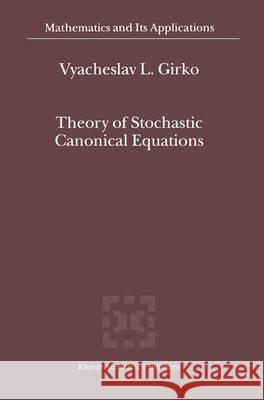Theory of Stochastic Canonical Equations: Volumes I and II » książka
Theory of Stochastic Canonical Equations: Volumes I and II
ISBN-13: 9781402000751 / Angielski / Twarda / 2001 / 960 str.
Theory of Stochastic Canonical Equations collects the major results of thirty years of the author's work in the creation of the theory of stochastic canonical equations. It is the first book to completely explore this theory and to provide the necessary tools for dealing with these equations. Included are limit phenomena of sequences of random matrices and the asymptotic properties of the eigenvalues of such matrices. The book is especially interesting since it gives readers a chance to study proofs written by the mathematician who discovered them.
All fifty-nine canonical equations are derived and explored along with their applications in such diverse fields as probability and statistics, economics and finance, statistical physics, quantum mechanics, control theory, cryptography, and communications networks. Some of these equations were first published in Russian in 1988 in the book Spectral Theory of Random Matrices, published by Nauka Science, Moscow.
An understanding of the structure of random eigenvalues and eigenvectors is central to random matrices and their applications. Random matrix analysis uses a broad spectrum of other parts of mathematics, linear algebra, geometry, analysis, statistical physics, combinatories, and so forth. In return, random matrix theory is one of the chief tools of modern statistics, to the extent that at times the interface between matrix analysis and statistics is notably blurred.
Volume I of Theory of Stochastic Canonical Equations discusses the key canonical equations in advanced random matrix analysis. Volume II turns its attention to a broad discussion of some concrete examples of matrices. It contains in-depth discussion of modern, highly-specialized topics in matrix analysis, such as unitary random matrices and Jacoby random matrices.
The book is intended for a variety of readers: students, engineers, statisticians, economists and others.











